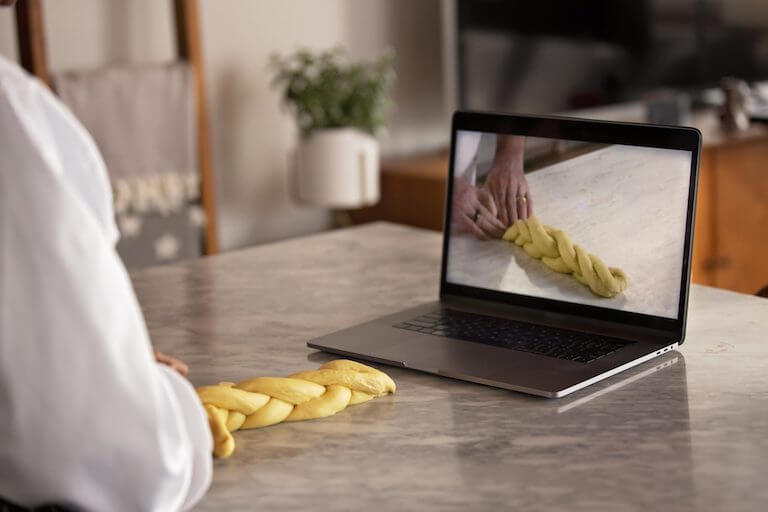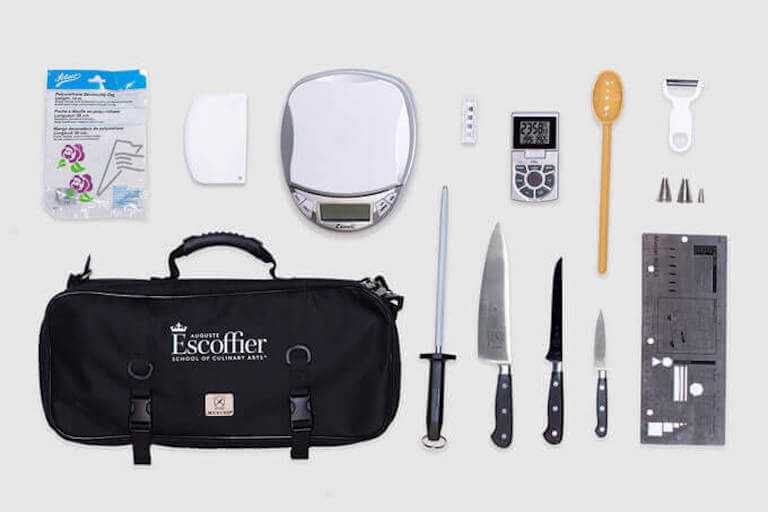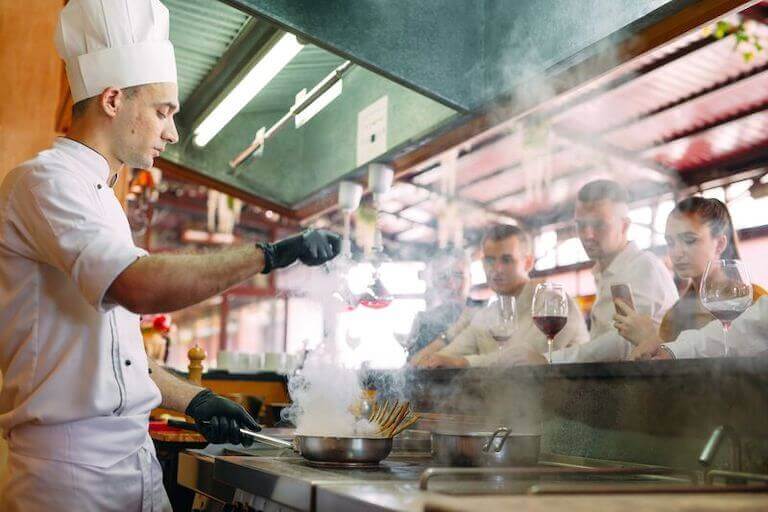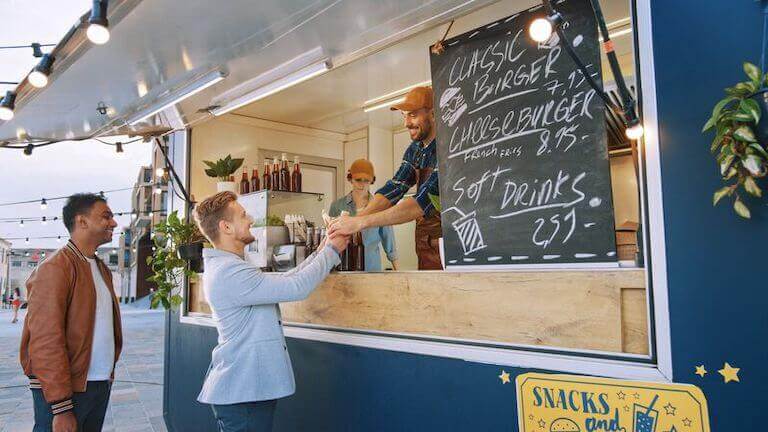Listen to This Article:
Interested in pursuing a culinary education?
You don’t necessarily have to choose between your current responsibilities and achieving your culinary goals. Every day, people from all walks of life are moving one step closer to a culinary career by earning a degree from home.
If you are looking to gain a culinary education, but can’t afford to spend your days on campus–or maybe can’t find a campus near you–you might be considering an online education instead.
As you read about the advantages of online learning and how it works, you may find that it’s never been easier to earn a culinary degree from home.
How Does Online Culinary School Work?
Online culinary school is more like traditional learning than you might think. Much like in a classroom, online students at Escoffier can complete coursework, receive personalized feedback, attend live sessions, and participate in hands-on activities, including a hands-on industry externship.
How Are Online Courses Taught?
The image of impersonal instruction that online school might conjure is often an antiquated one. In reality, online culinary education at Auguste Escoffier School of Culinary Arts is highly personal. Students can access live, online instruction from industry experts. These sessions can often include demonstrations where students ask questions and receive answers in real time. Plus, you can interact with other students, building a nationwide network from wherever you are.
Online lessons are often supplemented with reading and video content, and arguably the most important piece–practice! Each week, students can complete assignments from their own kitchens, documenting progress with photos and notes.
“The chef instructors are all amazing. They have tutoring and workshops and they answer all of your questions with so much dedication.”*
Elizabeth A., Online Bakery & Pastry Student
What About Grading and Feedback?
You may be wondering how chef instructors grade dishes without tasting or seeing them in person. For each assignment, students carefully record their cooking process and describe the flavor profile they are building. They also submit photos, plus an analysis of the taste, texture, and overall outcome of their dish to their instructor.
Chef Instructors then analyze students’ work and may provide personalized feedback and suggestions for improvement. Because of their experience and expertise in the field, Chef Instructors are able to determine the success of a dish through the information students provide, as well as visual cues.
This process can help equip students with technical culinary skills, as well as an opportunity to practice the analytical and communication skills that are often valued highly in the culinary field. In fact, online students can often become especially well-practiced in culinary communication because they rely on this skill for grading and coaching.
This one-on-one feedback has been crucial for students like Waverly Boyce, an online Culinary Arts graduate. “The Chef Instructors at Escoffier, especially online, put in a lot of effort and time to connect with us students. I’m a graduate of the online program. It really works.”*

Online students can practice culinary techniques and receive instructor feedback at home.
What’s the Schedule Like?
While a day in the life of an online culinary student varies, you can expect to spend anywhere from 15 to 22 hours per week, depending on your program, credential, and individual pace. Each week, students can participate in scheduled, live video discussions and lectures. Though instructors offer live lectures, they are also recorded so students can access them on their own schedule.
Lectures must be attended (whether live or watching the recording later) and assignments are still due by a deadline, but online students can fit these into their existing schedule. Online students may have the ability to plan ahead of time and complete assignments throughout the week, where they fit best.
Chef Instructors explain how online students practice hands-on skills at home.
What Materials Might You Need for Online Culinary School?
First things first: you’ll need WiFi and a device to complete your program. A strong internet connection is important to ensure lectures and online interactions are clear and easy to understand. But when it comes to the kitchen, online culinary students receive a standard toolkit containing some essential utensils and tools for their specific program, as well as a chef’s uniform complete with a coat, apron, and skull cap.
These toolkits vary based upon your program. For example, a Pastry Arts student may receive different materials than a Culinary Arts student would. But both include many of the essentials needed for coursework.
Online students will also need to gather ingredients to complete weekly assignments. Chef Instructors provide online students with a list of ingredients and equipment needed for assignments so students can prepare in advance.

Online culinary students are equipped with a toolkit of culinary essentials.
How Can Online Students Build Industry Experience?
After so much practice, you want to put your skills into action in the real world! That is where externships come in. Just like their peers attending in-person programs, online students must complete one or two hands-on industry externships, depending on their program.
This is the one piece of the online program that cannot be completed in your home kitchen. With help from Escoffier career services, online students may be able to get help connecting with a foodservice establishment that is both convenient for them and relevant to the skills they are learning.
Externships differ from internships in that they are shorter, and more directly focused on the skills each student has been learning. Where online students have previously relied on virtual feedback and training, they can now hone their skills with in-person practice and feedback.

Students can put the skills they’ve learned online into practice during externships.
Which Degrees Can You Earn From Home?
With Escoffier’s variety of online programs, it might be simpler to ask, “What diploma or degree can’t you earn from home?” Students may choose between earning a diploma or associate degree in various disciplines.
Diploma programs are typically shorter and can help equip students with the technical skills they may need to succeed in the workplace. Associate degree programs dive a bit deeper, equipping students with not only some helpful technical skills, but also the logistical and communication skills they may need to run a food business.
Online students can choose a diploma or associate degree, depending on the program, in the following disciplines:
Culinary Arts explores culinary techniques and food preparation methods, as well as management and business skills like how to communicate effectively in the kitchen.
Pastry Arts students can practice advanced technical skills in the science of baking and pastry, as well as the business skills they may need to open their own bakery.
Food Entrepreneurship can equip students with the skills to start their own food business, including business planning, food marketing, and other core entrepreneurial abilities.
Plant-Based Culinary Arts students can discover how to use plant-based ingredients and techniques to promote healthy, sustainable cuisine.
Holistic Nutrition & Wellness can equip students to create a career in the wellness industry with knowledge in nutrition, mindfulness, and healthy lifestyles.
Hospitality & Restaurant Operations Management students can explore best business practices to help them excel in hospitality and management-related careers.

Some online students apply the skills they learn to launch their own food business.
The Benefits of Earning Your Culinary Degree from Home
Online learning can be an excellent alternative to an in-person degree program. Here are some of the benefits online students may find:
Freedom & Flexibility
The major difference between online and in-person classes is flexibility. Rather than being tied to a specific class schedule, students can complete coursework around their existing career and obligations. This may also mean more time for family, friends, or leisure. Additionally, it can free up time to practice skills related to a student’s personal or professional goals.
“I work two jobs and I’m able to get my degree while still having my chefs help me along.”*
Delori L., Online Baking & Pastry Student
Career Preparation
Online and traditional students can be prepared for careers in the culinary field upon graduation. This is due in part to the externship requirements of both programs, as well as the hands-on coursework and expert instruction online students can also receive. Some students use the added flexibility of online learning to their advantage, spending more time practicing skills and working within the industry than they’d otherwise be able to do.
So if you’re wondering who hires online culinary school graduates, the answer is generally the same people who hire traditional graduates. Ultimately, employers are often more interested in your skills, regardless of the format through which you gained them.
On the other hand, many online students gain the skills to become their own employers. For Heather Arcay, Escoffier’s online Culinary Arts degree gave her the skills she needed to blaze her own path in the culinary world.*
“The school and experience sparked two exciting adventures for me–building my own allergy-friendly cookie business, Gaia Cookies, and starting a food blog for fun on the side. The program provided unlimited access to education and resources. 100% worth it in my opinion!”*
Heather Arcay, Online Culinary Arts Graduate
Affordability**
Is online school really cheaper than in-person? When you weigh the length of the program, material costs, and other fees associated, sometimes online learning is moderately more cost effective! Sometimes program costs can be similar. But many students find that saving drive time, gas money, and parking costs falls in favor of online education. Additionally, online school seldom requires relocating or changing jobs.
But even with these slight differences, students should consider culinary school an investment that may bring them closer to their personal goals, and remember that online programs require the same level of commitment as in-person options.
At Escoffier, the cost differences between online and traditional programs are moderate. But just like on-campus students, online students can take advantage of federal financial aid if they apply and qualify. Financial advisors are on hand to help students identify funding sources and financial aid options available to them.
“It was a desire of mine for many years to attend culinary school. Due to where I live and my personal responsibilities, I could not attend culinary school in person since the closest onsite school was a two-hour drive. I am most proud of my ability to complete the classes and assignments while working full time, caring for loved ones, and participating in church events.”*
Sharon Watts, Online Culinary Arts Graduate
Find What Fits Your Lifestyle (& Location)
Online culinary school can remove barriers for many students. As mentioned, these barriers can be busy schedules and family demands. But they can also be geographical. Earning a degree from home can enable you to attend a top-tier culinary school and be taught by industry experts, no matter where you live.
If you are unsure about what your culinary future might hold, online school can let you put a foot in the door, explore your options, and gain skills within the security of your current career and lifestyle. If you’re looking to fit culinary education into your future, it might be as close as your kitchen. Talk to someone about how to earn a culinary degree from home today!
Check out these articles to learn more about your online culinary school options:
- 5 Benefits of Online Culinary School Classes
- How Full-Time, Working Adults Can Succeed in Online Culinary School
- Is Online Baking School Right For You?
*Information may not reflect every student’s experience. Results and outcomes may be based on several factors, such as geographical region or previous experience.
**Consider your situation and resources to determine what is affordable and on budget, for you.

